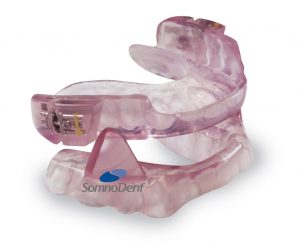
Have you ever been constantly tired no matter how much coffee you drink? Do you frequently wake up with a sore throat? Has your bed partner complained about your loud snoring? If yes, you might have sleep apnea, a disease where you temporarily stop breathing in the night. One way to get it treated is by seeing your dentist and getting a snoring mouthguard made. Let’s talk about getting used to this oral appliance.
What is Sleep Apnea?
Sleep apnea is a cessation of breathing during sleep. It’s typically caused by tissues in the throat collapsing and blocking the airway. This causes the body to go into panic mode and wake you up. If this happens several times a night, it can interfere with your quality of sleep. If you have any of the following symptoms, contact your dentist for sleep apnea treatment:
- Waking up with a headache or sore throat
- Loud snoring
- Excessive daytime exhaustion
- Waking up gasping or choking during the night
- Mood swings or depression
How Do Oral Appliances Help?
Your dentist can help treat sleep apnea with an oral appliance. This device is worn over the teeth and is designed to open the airways to make breathing easier and to prevent obstruction. It will gradually pull your lower jaw forward to keep the airways open. Be sure to get a custom-made appliance from your dentist to make sure it fits just right. You can find some for a lower price on the Internet, but they might move around in your sleep and cause breathing problems because they don’t fit like they should.
How Long Does It Take to Get Used to My Snoring Mouthguard?
While it may take two to six months for any noticeable different in your quality of sleep, it shouldn’t take nearly that long to get used to the way it feels. As with any oral device, there will probably be some discomfort as first. However, that should pass after the first week or two.
What Are Some Tips for Getting Used to My Oral Appliance?
Here are some tips for growing accustomed to your oral appliance:
- Power through the discomfort.
- Get a custom-fit snoring mouthguard from your dentist.
- Put your mouthguard in for a few minutes before you go to bed to get used to the feeling.
- Keep your mouth guard clean by brushing it whenever you brush your teeth at night. If you don’t clean it, it can hold bacteria and give you bad breath and tooth decay.
Investing in a snoring mouthguard for sleep apnea treatment is a great way to ensure you get quality sleep. If you are interested in getting an oral appliance, contact your dentist today.
About the Author
Dr. Keane Fedoksy graduated from Baylor College of Dentistry in 1991. He has 20 years of experience in oral appliance therapy and the treatment of sleep apnea. He is a member of the American and Texas Dental Associations, and the American Academy of Dental Sleep Medicine. To learn more about how he can treat your snoring, click here or call (972)-753-3737.
